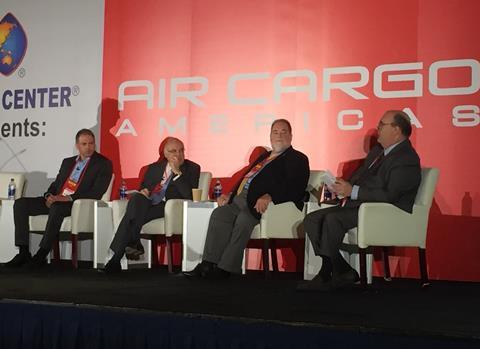
Airports will play an increasingly important role in air cargo supply chains as lead times become increasingly shorter.
Speaking at the Air Cargo Americas event in Miami, Sao Paulo's GRU Airport chief executive Gustavo Figueiredo said that the role of airports in the air cargo has changed completely over the last ten years because supply chains have become increasingly fast, driven by e-commerce and just-in-time production.
In the past, airports were simply infrastructure providers and a transhipment point, he said, but today they are much more than that.
“Airports must today provide information in real time, the capability to [consolidate] different shipments from different parts of the world and have the ability to provide the information for the customers to do the last mile directly from the airport.
“With the e-commerce business we have to work together with the authorities to make it possible to clear the goods as fast as we can because to deliver in one day in a country like Brazil, with such large distances, requires a very smooth and efficient process.
“Airports have to sit together with the authorities and stakeholders and make it possible.”
Figueiredo added that airports today also had to be flexible when it comes to customer requirements.
He explained that a big company may want to operate its own hub at the airport, whereas a smaller player may want the airport to provide and operate cargo handling infrastructure as well as provide value-added services such as assembly.
“We must have the flexibility to offer a different model for each type of requirement in the supply chain,” Figueiredo said.
“Another thing we see that will change in the future is that with this challenge [of shorter] lead time requirements, from the customer perspective, airports will be an important hub in the supply chain.
“Companies are trying to reduce the [number of] nodes in their supply chains and airports will be an important place to add more services and activities [currently provided elsewhere in the supply chain] to enable them to reduce lead times and improve the performance of supply chains.”
This view was echoed by Modern Logistics vice president of commercial and marketing Adalberto Febeliano who said that airports must become more a part of global supply chains.
He gave the example of automotive just-in-time supply chains, suggesting airports could receive parts from several suppliers and then sort them to go to the correct part of the production line rather than do this elsewhere.
Also in the session, the airline panellists were asked how they are tackling the opportunity presented by e-commerce.
Amerijet International chief executive Vicken Karjian said that it needed to be close to its customers.
He pointed out that it can take six months to develop a new product, so it needed to be ahead of the curve in terms of understanding what customers will require.
Avianca Cargo commercial director Carlos Andres Arango said that it had launched an e-commerce product but added that “for an airline, it is not as easy as it may seem”.
“Avianca had to change the whole process and mentality of cargo [when launching the e-commerce product] because you are not moving general cargo, you are moving small items with high volumes.”
Air Cargo Americas is taking place in Miami from October 29-31















